Inteo.xyz ads (Tutorial) - Chrome, Firefox, IE, Edge
Inteo.xyz ads Removal Guide
What is Inteo.xyz ads?
Inteo.xyz promises users a video after they subscribe for notifications

Questionable and fraudulent websites are created at an increased rate for many years now – all of these are meant to harm way users in one way or another, all while benefitting the crooks. Inteo.xyz is one such website – it is built on deception and is intended to scam users to subscribe to notifications and forward them to other malicious sites.
In most cases, users do not visit such websites intentionally – they are redirected from somewhere else, and it usually happens when they click on a deceptive link or are taken by an URL redirect[1] automatically. In more rare cases, frequent browser redirects can also signify adware infection, which definitely should be addressed.
The main goal of the Inteo.xyz scam is to make users push the “Allow” button that is visible immediately upon the site entry. In the background, visitors are commonly shown a message or a picture that encourages them to proceed with such a request. If they do, they will start receiving intrusive pop-ups on their desktops at random times; they can be very disruptive and include links to other malicious websites.
If you are suffering from these push notifications, you can easily get rid of them as long as you follow the instructions we provide below. Additionally, checking your system for adware and malware is also something that should be performed.
| Name | Inteo.xyz |
|---|---|
| Type | Push notifications, scam, ads |
| IP address | 152.44.36.206 |
| Distribution | Website authors use scam techniques to ensure users click the “Allow” button upon website entry |
| Symptoms | Notifications show up on the desktop at random times |
| Dangers | Clicking on links that are embedded within the notification prompt, navigating the sites these links bring to or downloading files can be very dangerous. This can result in malware infections, financial losses or privacy issues |
| Elimination | To prevent the site from displaying notifications to you, you should access the settings of your web browser how it is explained below |
| Further steps | Redirects to suspicious websites might mean that your computer is infected with adware, so you should check for it either manually or by using security software. Additionally, fixing virus damage, if such occurs, is very easy with a repair tool FortectIntego |
Here's what you need to know about adware
There is a high chance that you have accessed a deceptive website after clicking a suspicious link by accident on a random website. This is particularly common when visiting and exploring websites of dubious content – torrents/cracks,[2] gambling, adult-oriented, etc. In order to avoid this in the future, you should stay away from websites that are considered high-risk.
Another reason for redirects is a potentially unwanted program (PUP)[3] that is installed on your system without your knowledge. Adware is usually bundled with other free applications you download from third-party websites, hence you might not even know that you have it installed on your system.
Adware specializes in displaying to users commercial content that might not always be safe. This includes pop-up windows, banners, in-text links, auto-play video ads, and more. Additionally, some more aggressive adware might also engage in browser redirects. Thus, if you are being redirected to websites such as Inteo.xyz, Clausephotographer.com, Seumsiden.online, or similar, you should check whether there is a potentially unwanted program is running in the background.
In order to check whether your system is clear from infections, you should scan your device with powerful anti-malware software, such as SpyHunter 5Combo Cleaner. It can automatically detect whether some malicious or unwanted files would otherwise be hidden from a regular user's view.
If adware or malware was indeed found on your device, we strongly recommend you also check your web browsers in order to complete its elimination; otherwise, data tracking and display of ads might continue. If you want to do that quickly, we recommend using FortectIntego maintenance utility – it can also fix any malware-damaged system components automatically. Alternatively, you will find the step-by-step instructions on how to clean your browser cache and cookies at the bottom of this post.
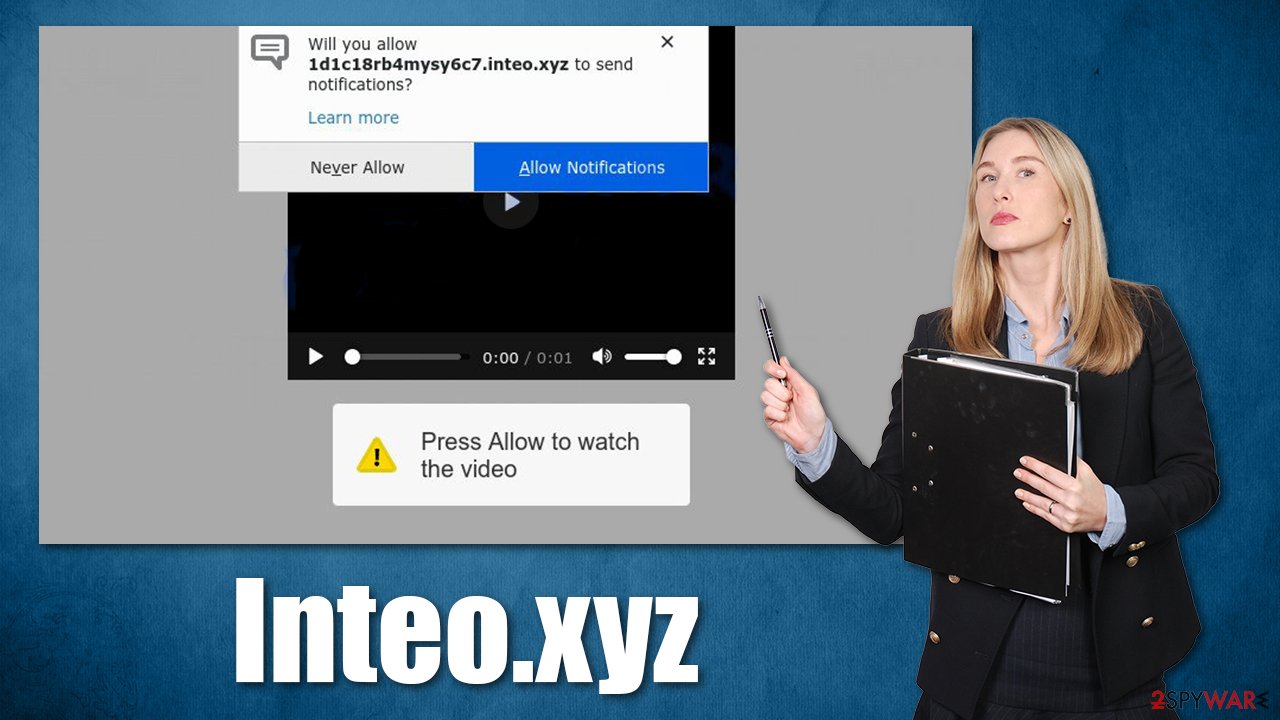
Scam explained: how to stop Inteo.xyz ads
Many users believe that the intrusive Inteo.xyz ads are caused by a virus, although this might not always be true. In fact, it mostly isn't. Push notifications are not inherently malicious, as it is a regular web browser feature that is used to transfer information from the website directly to your desktop. In order for this to work, you need to grant a website permission to do this by pressing the “Allow” button.
Upon accessing the site due to one reason or another, you are likely to see an imitation of a video that is about to be played. Below the picture, you would also see a message marked by the exclamation mark, which reads:
Press Allow to watch the video
In this instance, crooks give users the reason for the request to be fulfilled – click the button, and you will be rewarded. This is a very typical scam technique that works.
This is just one example of what you might be shown, however, as the site authors use other techniques in order to deceive users. For example, the “robot check” or “captcha check” are also used as familiar elements to make the scam more believable – people think that it is a simple verification process broadly used by many websites.
However, regardless if Allow or Block is pressed within the notification prompt, there is no video to view and no other content to explore. In the best-case scenario, you will be reloaded to the same page; in the worst case, you will be redirected to another website of dubious content, which can include anything – even malicious files that would be downloaded automatically.
If you were tricked into subscribing to these notifications, you could easily revert that. Below you will find a guide for all modern web browsers.
Google Chrome (desktop):
- Open Google Chrome browser and go to Menu > Settings.
- Scroll down and click on Advanced.
- Locate Privacy and security section and pick Site Settings > Notifications.
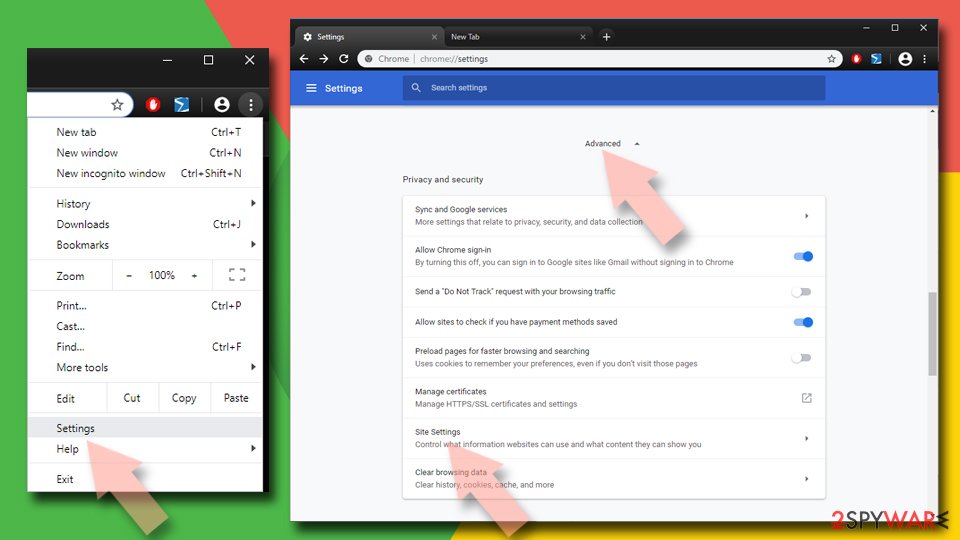
- Look at the Allow section and look for a suspicious URL.
- Click the three vertical dots next to it and pick Block. This should remove unwanted notifications from Google Chrome.

Google Chrome (Android):
- Open Google Chrome and tap on Settings (three vertical dots).
- Select Notifications.
- Scroll down to Sites section.
- Locate the unwanted URL and toggle the button to the left (Off setting).

Mozilla Firefox:
- Open Mozilla Firefox and go to Menu > Options.
- Click on Privacy & Security section.
- Under Permissions, you should be able to see Notifications. Click Settings button next to it.
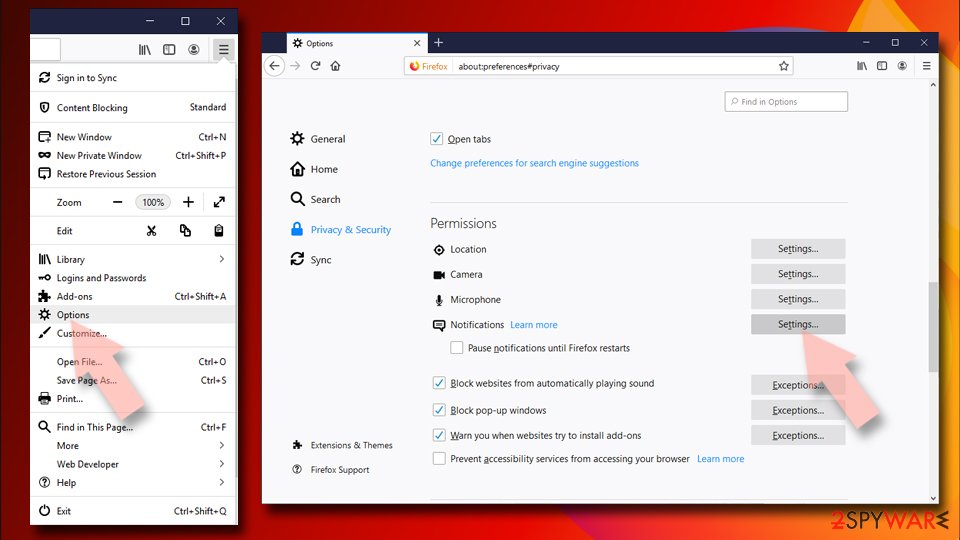
- In the Settings – Notification Permissions window, click on the drop-down menu by the URL in question.
- Select Block and then click on Save Changes. This should remove unwanted notifications from Mozilla Firefox.

Safari:
- Click on Safari > Preferences…
- Go to Websites tab and, under General, select Notifications.
- Select the web address in question, click the drop-down menu and select Deny.

MS Edge:
- Open Microsoft Edge, and click the Settings and more button (three horizontal dots) at the top-right of the window.
- Select Settings and then go to Advanced.
- Under Website permissions, pick Manage permissions and select the URL in question.
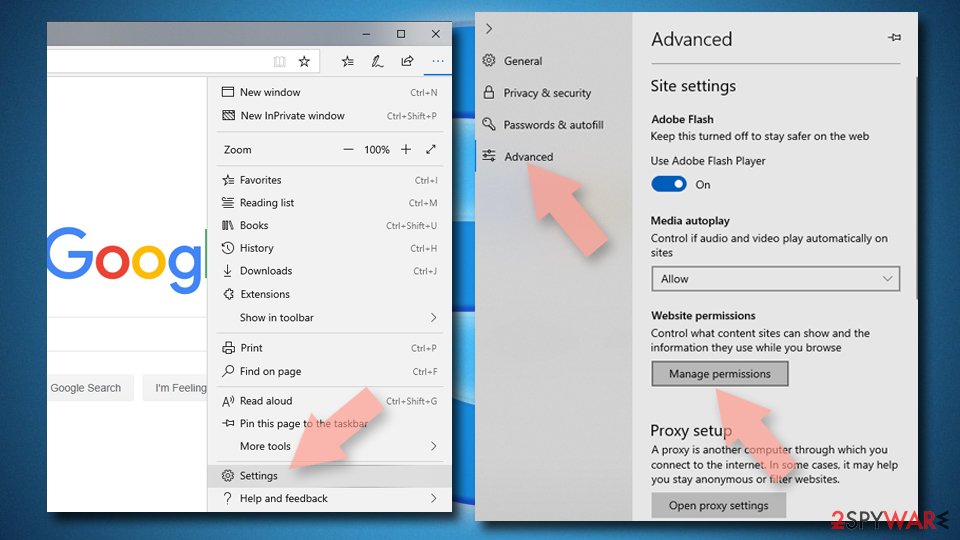
- Toggle the switch to the left to turn notifications off on Microsoft Edge.
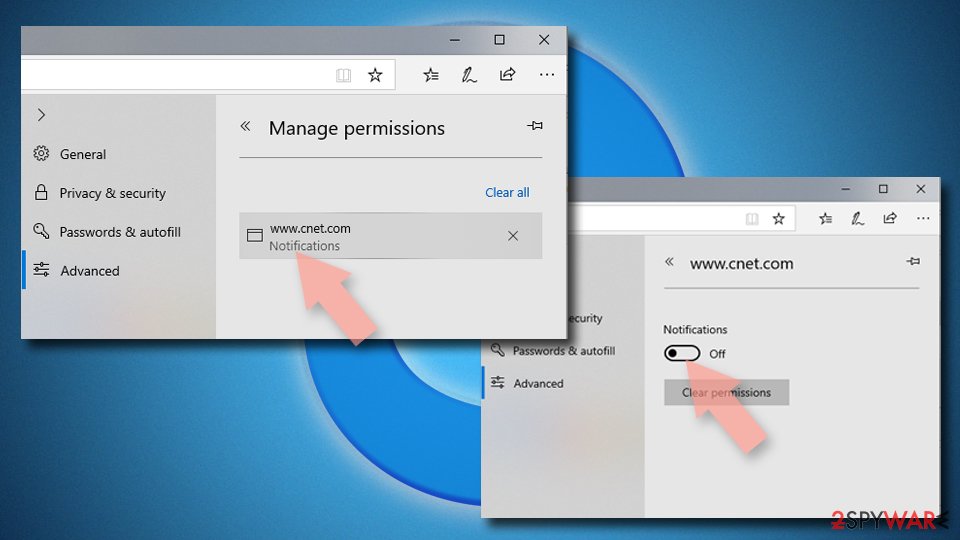
MS Edge (Chromium):
- Open Microsoft Edge, and go to Settings.
- Select Site permissions.
- Go to Notifications on the right.
- Under Allow, you will find the unwanted entry.
- Click on More actions and select Block.

Internet Explorer:
- Open Internet Explorer, and click on the Gear icon at the top-right on the window.
- Select Internet options and go to Privacy tab.
- In the Pop-up Blocker section, click on Settings.
- Locate web address in question under Allowed sites and pick Remove.

Disable notification prompts [bonus]
If you think that you would do better without having to deal with push notifications in general, there is a way to disable prompts via browser settings. Alternatively, you can also make them accessible but much less intrusive. Here are the instructions for Chrome:
- Open Google Chrome
- Go to Menu > Settings
- Scroll down to Privacy and security section
- Select Site Settings
- Scroll down again and pick Notifications
- Choose Use quieter messaging option.
In order to stop notifications completely, you can select the Don't allow sites to show notifications option here.
You may remove virus damage with a help of FortectIntego. SpyHunter 5Combo Cleaner and Malwarebytes are recommended to detect potentially unwanted programs and viruses with all their files and registry entries that are related to them.
Getting rid of Inteo.xyz ads. Follow these steps
Remove from Google Chrome
Delete malicious extensions from Google Chrome:
- Open Google Chrome, click on the Menu (three vertical dots at the top-right corner) and select More tools > Extensions.
- In the newly opened window, you will see all the installed extensions. Uninstall all the suspicious plugins that might be related to the unwanted program by clicking Remove.

Clear cache and web data from Chrome:
- Click on Menu and pick Settings.
- Under Privacy and security, select Clear browsing data.
- Select Browsing history, Cookies and other site data, as well as Cached images and files.
- Click Clear data.

Change your homepage:
- Click menu and choose Settings.
- Look for a suspicious site in the On startup section.
- Click on Open a specific or set of pages and click on three dots to find the Remove option.
Reset Google Chrome:
If the previous methods did not help you, reset Google Chrome to eliminate all the unwanted components:
- Click on Menu and select Settings.
- In the Settings, scroll down and click Advanced.
- Scroll down and locate Reset and clean up section.
- Now click Restore settings to their original defaults.
- Confirm with Reset settings.

Remove from Microsoft Edge
Delete unwanted extensions from MS Edge:
- Select Menu (three horizontal dots at the top-right of the browser window) and pick Extensions.
- From the list, pick the extension and click on the Gear icon.
- Click on Uninstall at the bottom.

Clear cookies and other browser data:
- Click on the Menu (three horizontal dots at the top-right of the browser window) and select Privacy & security.
- Under Clear browsing data, pick Choose what to clear.
- Select everything (apart from passwords, although you might want to include Media licenses as well, if applicable) and click on Clear.

Restore new tab and homepage settings:
- Click the menu icon and choose Settings.
- Then find On startup section.
- Click Disable if you found any suspicious domain.
Reset MS Edge if the above steps did not work:
- Press on Ctrl + Shift + Esc to open Task Manager.
- Click on More details arrow at the bottom of the window.
- Select Details tab.
- Now scroll down and locate every entry with Microsoft Edge name in it. Right-click on each of them and select End Task to stop MS Edge from running.

If this solution failed to help you, you need to use an advanced Edge reset method. Note that you need to backup your data before proceeding.
- Find the following folder on your computer: C:\\Users\\%username%\\AppData\\Local\\Packages\\Microsoft.MicrosoftEdge_8wekyb3d8bbwe.
- Press Ctrl + A on your keyboard to select all folders.
- Right-click on them and pick Delete

- Now right-click on the Start button and pick Windows PowerShell (Admin).
- When the new window opens, copy and paste the following command, and then press Enter:
Get-AppXPackage -AllUsers -Name Microsoft.MicrosoftEdge | Foreach {Add-AppxPackage -DisableDevelopmentMode -Register “$($_.InstallLocation)\\AppXManifest.xml” -Verbose

Instructions for Chromium-based Edge
Delete extensions from MS Edge (Chromium):
- Open Edge and click select Settings > Extensions.
- Delete unwanted extensions by clicking Remove.

Clear cache and site data:
- Click on Menu and go to Settings.
- Select Privacy, search and services.
- Under Clear browsing data, pick Choose what to clear.
- Under Time range, pick All time.
- Select Clear now.

Reset Chromium-based MS Edge:
- Click on Menu and select Settings.
- On the left side, pick Reset settings.
- Select Restore settings to their default values.
- Confirm with Reset.

Remove from Mozilla Firefox (FF)
Remove dangerous extensions:
- Open Mozilla Firefox browser and click on the Menu (three horizontal lines at the top-right of the window).
- Select Add-ons.
- In here, select unwanted plugin and click Remove.

Reset the homepage:
- Click three horizontal lines at the top right corner to open the menu.
- Choose Options.
- Under Home options, enter your preferred site that will open every time you newly open the Mozilla Firefox.
Clear cookies and site data:
- Click Menu and pick Settings.
- Go to Privacy & Security section.
- Scroll down to locate Cookies and Site Data.
- Click on Clear Data…
- Select Cookies and Site Data, as well as Cached Web Content and press Clear.

Reset Mozilla Firefox
If clearing the browser as explained above did not help, reset Mozilla Firefox:
- Open Mozilla Firefox browser and click the Menu.
- Go to Help and then choose Troubleshooting Information.

- Under Give Firefox a tune up section, click on Refresh Firefox…
- Once the pop-up shows up, confirm the action by pressing on Refresh Firefox.

Delete from Safari
Remove unwanted extensions from Safari:
- Click Safari > Preferences…
- In the new window, pick Extensions.
- Select the unwanted extension and select Uninstall.

Clear cookies and other website data from Safari:
- Click Safari > Clear History…
- From the drop-down menu under Clear, pick all history.
- Confirm with Clear History.

Reset Safari if the above-mentioned steps did not help you:
- Click Safari > Preferences…
- Go to Advanced tab.
- Tick the Show Develop menu in menu bar.
- From the menu bar, click Develop, and then select Empty Caches.

After uninstalling this potentially unwanted program (PUP) and fixing each of your web browsers, we recommend you to scan your PC system with a reputable anti-spyware. This will help you to get rid of Inteo.xyz registry traces and will also identify related parasites or possible malware infections on your computer. For that you can use our top-rated malware remover: FortectIntego, SpyHunter 5Combo Cleaner or Malwarebytes.
How to prevent from getting adware
Choose a proper web browser and improve your safety with a VPN tool
Online spying has got momentum in recent years and people are getting more and more interested in how to protect their privacy online. One of the basic means to add a layer of security – choose the most private and secure web browser. Although web browsers can't grant full privacy protection and security, some of them are much better at sandboxing, HTTPS upgrading, active content blocking, tracking blocking, phishing protection, and similar privacy-oriented features. However, if you want true anonymity, we suggest you employ a powerful Private Internet Access VPN – it can encrypt all the traffic that comes and goes out of your computer, preventing tracking completely.
Lost your files? Use data recovery software
While some files located on any computer are replaceable or useless, others can be extremely valuable. Family photos, work documents, school projects – these are types of files that we don't want to lose. Unfortunately, there are many ways how unexpected data loss can occur: power cuts, Blue Screen of Death errors, hardware failures, crypto-malware attack, or even accidental deletion.
To ensure that all the files remain intact, you should prepare regular data backups. You can choose cloud-based or physical copies you could restore from later in case of a disaster. If your backups were lost as well or you never bothered to prepare any, Data Recovery Pro can be your only hope to retrieve your invaluable files.
- ^ URL redirection. Wikipedia. The free encyclopedia.
- ^ Ben Stegner. 5 Real Security Dangers of Downloading Pirated Video Games. MakeUseOf. Your guide in modern tech.
- ^ Chris Hoffman. PUPs Explained: What is a “Potentially Unwanted Program”?. How-to Geek. Site that explains technology.
